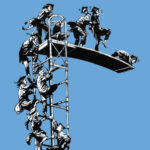The Time is Now
Prepare young people for the future of work!
The history of the United States has been shaped and reshaped by the strong work ethic of its people and by successive technological revolutions. In the first technological revolution, water, and steam power mechanized production. In the second, electric power enabled mass production. Then, in the third revolution, electronics and information technology helped automate production.
And now, a new revolution in artificial intelligence and biotechnology is beginning to change the way we live and work. Old jobs are disappearing. New ones are being created. Nearly half of the American jobs are likely to be changed in significant ways.49
In the earliest moments of any revolution, no one can be sure how things will turn out or of the many ways that our lives will be affected. Amidst all this uncertainty, though, there are at least a few things that we can be sure of:
Change will be pretty constant, with the average young American holding more than 11 different jobs between the ages of 18 and 50.50
Many workers won’t be working at traditional jobs—one employer, one location, with benefits—at all, with increasing numbers likely to be contingent workers, working part-time, on contract, sometimes sporadically, and often remotely.52
Jobs will increasingly demand technological skills, social-emotional skills, and higher-level thinking skills such as creativity and critical thinking.53
The pace of change could get even faster.54
So how do we prepare students for all of this change?
First, and most importantly, education matters—an especially postsecondary education. Workers with more education navigate change more effectively; they earn more and their wages grow faster, they are less likely to be unemployed, and they get more on-the-job training, too.55
Second, as job-specific skills continue to change, solid knowledge in core academic content areas and strong fundamental skills like reading, writing, numeracy, and technological literacy will be ever more important to the “continuous learning” that will be required of virtually everybody.56
Third, as many work tasks are being automated, the essentially human parts of work are becoming more important, with skills such as empathy, problem-solving, and strategic decision-making more valuable than ever.
Finally, all these skills and talents are buttressed by a set of competencies that foster success across many domains of work and life, including tenacity, agency, flexibility, and curiosity.58
Across the country, redesigned high schools are working hard on all these fronts, determined to make sure that their graduates don’t just master book smarts but human smarts as well.
What about your graduates: Will they be ready?
Resources
